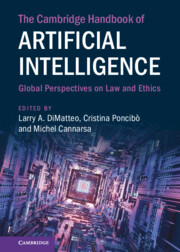Book contents
- The Cambridge Handbook of Artificial Intelligence
- The Cambridge Handbook of Artificial Intelligence
- Copyright page
- Contents
- Figures
- Contributors
- Foreword
- Preface
- Part I AI: Development and Trends
- Part II AI: Contracting and Corporate Law
- Part III AI and Liability
- Part IV AI and Physical Manifestations
- Part V AI and Intellectual Property Law
- 15 Patenting AI
- 16 Patentability of AI
- 17 AI as Inventor
- 18 AI and Copyright Law
- Part VI Ethical Framework for AI
- Part VII Future of AI
15 - Patenting AI
The US Perspective
from Part V - AI and Intellectual Property Law
Published online by Cambridge University Press: 28 July 2022
- The Cambridge Handbook of Artificial Intelligence
- The Cambridge Handbook of Artificial Intelligence
- Copyright page
- Contents
- Figures
- Contributors
- Foreword
- Preface
- Part I AI: Development and Trends
- Part II AI: Contracting and Corporate Law
- Part III AI and Liability
- Part IV AI and Physical Manifestations
- Part V AI and Intellectual Property Law
- 15 Patenting AI
- 16 Patentability of AI
- 17 AI as Inventor
- 18 AI and Copyright Law
- Part VI Ethical Framework for AI
- Part VII Future of AI
Summary
As the use of AI grows ever more prevalent and sophisticated, the issuesof the patentability of AI will need be addressed by the US Congress, USPTO, and the courts. While the questions raised with respect to patenting AI have been debated and are now being considered more broadly, few have been definitively answered. Early address and resolution of these issues will allow patent law to keep pace with the new tide of AI-related technologies and inventions.
Keywords
- Type
- Chapter
- Information
- The Cambridge Handbook of Artificial IntelligenceGlobal Perspectives on Law and Ethics, pp. 215 - 222Publisher: Cambridge University PressPrint publication year: 2022
- 1
- Cited by

